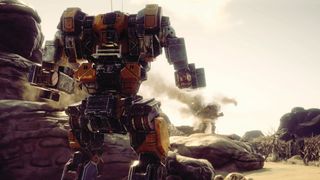LESS T_T
Arcane
- Joined
- Oct 5, 2012
- Messages
- 13,582
![The Year of Incline [2014] Codex 2014](/forums/smiles/campaign_tags/campaign_incline2014.png)
They published an edited transcription after a month for some reason: https://www.gamasutra.com/view/news/312777/Inside_the_Harebrained_task_of_reviving_Battletech.php
Inside the Harebrained task of reviving Battletech
When it comes to the history of tabletop games and PC games, the Battletech series looms as large as a Mad Cat Mk II stomping over the battlefield. But thanks to shifting player demands and a screwy licensing history, the series has been absent from prominence for a few years now.
But late last year, the folks at Harebrained Schemes released the first backer build for Battletech, the Kickstarted turn-based tactical game that makes a stab at adapting the conventions of the tabletop series to video game format.
At the time, we were lucky enough to grab game director Mike McCain on the Gamasutra Twitch channel, who was able to discuss the game's development process while fielding feedback from the game's backers.
If you're in the business of making strategy games (or just love seeing the nuts and bolts of how they're made), you should watch our full conversation up above, but we've also taken the liberty to transcribe some key insight for your perusal down below.
Stream Participants
Bryant Francis, Editor at Gamasutra
Alex Wawro, Editor at Gamasutra
Mike McCain, Game Director of Battletech at Harebrained Studios
Surviving the "Indiepocalypse"
Wawro: I'm trying to get your perspective on being a successful indie developer. Because I think its real tricky, and you have to get a bit of luck in there too to do well. I want to know what you personally, how you feel about the immediate future of indie games.
This game's coming out next year. Are you concerned at all about questions of discoverability, about getting it in front of the right people? Do you have ideas about how to do that well, on YouTube or with someone else?
McCain: I'm concerned, I don't have any deep answers necessarily. I've read all the articles: "The Indiepocalypse is happening!" "The Indiepocalypse is a myth!" I don't know. I do think the market is more and more crowded, and I think players have larger backlogs on Steam, and there's there's properties that have been out for five years that are still relevant.
Shadowrun games are an example, for an RPG in the same sort of realm of turn-based combat and text-heavy, coming out today, they're still going to be competing against our Shadowrun titles from five years ago, or worse on Steam. So yeah, I'm concerned.
That said, we're really excited about the potential that Battletech has for both the core of Battletech fandom and strategy games. And so I think we're hoping to reach a broader [audience], maybe some people who like XCOM will like Battletech too?
So I think, between what Paradox really brings to the deal and the momentum and goodwill we've built within the Battletech fanbase, and the prestige of the Battletech IP itself, and the quality of our game, I'm excited to see all that come together next year.
Wawro: Yeah, it's funny, I feel like, from the outside looking in, it feels like a decade or so ago, the idea about a mech game, specifically about a semi-hardcore, tactical, turn-based version was sort of unpopular because it had such a niche audience, and nowadays now having such a built-in niche is a huge boon, because you don't have to worry about hoping that people will find you game, there are a certain number of people who only want this game, and you can count on them coming out for you, and if you make a good game they're probably spread the word about it.
So it's funny how that kind of thing flips, as more games enter the market, all of a sudden having that tiny little niche is a huge deal.
McCain: Yeah, it's how wide are you going versus how deep, or some combination, and just having the energy of the Kickstarter community around the game has been huge, and their excitement with the initial backer beta release. Hopefully their excitement with the launch of the game, not only does that mean a lot to us internally, but hopefully they're write a Steam review or two and spread the word.
Diving into fog of war design
Francis: A question from the chat asks, "I'm kind of interested in this fog of war thing that helps set up the encounter. Can you tell us how you feel, as a designer, about fog of war as a concept? Because I think it's sort of aside from XCOM?
It's fallen out a little bit in favor compared to the heyday of the 90s, when every strategy game and RPG was using Fog of War in some way, to create this sense of the unknown as you would do an encounter. But nowadays players seem to value having a lot of information going into battles. How, as a designer, do you see it working in your favor here, and what's has it been like working with it in this game.
McCain: It's definitely been one of the more challenging things to balance. How far can you see, what are you sensor ranges. It's a little bit or aggressively pulled-in in the current backer beta incarnation than what we have at this point in our development branch. So it's something that's been tuned back and forth quite a bit.
A couple of goal statements early on were to have a strong purpose for lighter mechs on the battlefield. This was one of the problems of early incarnations of the game, in that it really became a race to the heaviest possible mechs with the biggest weapons that you could field. It's a tough balance to strike because lighter mechs are cheaper, they're not worth as many points, so on one level it's not going to have value on the battlefield as a heavier, more expensive mech, but we also wanted to make sure there was a role there, to have a good lance, a couple of heavier mechs, and maybe a long-range mech and a scouting mech, a lighter, more nimble scout unit.
The few things in the built right now, I don't know if you've noticed the sensor lock ability. Some of the pilots have that available, and you can actually mark a radar blip out in the distance to essentially extend your line of sight out to that target and shoot at it. So there's a coupe of things like that in the game.
Also, a pilot with a better Tactics skill can actually glean more information about the radar blips they can see. So we think that there's some interesting play in that space between, I've got an enemy mech on sensors, and I've got actual line-of-sight on an enemy, and that's where we kind of tried to emphasize the value of scouting ahead, so you can make a plan of engagement against your enemy.
The value of turn-based game design
Wawro: I wonder for you personally, that you've been with the studio for quite a long time. Presumably you could have left to find a new challenge. What is it about turn-based games that appeals to you as a game developer?
McCain: It's very discrete? I'd largely come back to those constraints on creativity. I think having that discrete problem set to work with is nice, and being able to iterate on some of the learnings and concepts from Shadowrun has been exciting too.
Ultimately for me, I'm absolutely interested in other stuff as well, but I think that each type of game probably, at the end of the day, presents a lot of the same challenges and excitements in terms of what will be fulfilling about that development experience.
Wawro: Can you think of some specific examples of what you think you've learned from the Shadowrun games that you've applied to the design of this one?
McCain: That's a great question, because I did allude to that.
Wawro: No pressure. (laughs)
McCain: I've got to back it now! I might struggle for concrete... because it is such a different scale of game, I struggle for concrete examples. I do think there's sort of a gut sensibility for what will work or won't work, that I personally didn't have as much of at the start of Shadowrun development, I felt that I picked up a better sense of smell for turn-based games, if that makes sense, by the end of it? Having that sort of gut navigation in place for this one would be part of it, I think.
But yes, specifics, for this game, it's as many things as we decided to do differently as decided to be the same, because it's such a free, organic 3D world, as opposed to the much more grid-based Shadowrun, and mechs are an order of magnitude larger than people.
Wawro: Yeah. I wonder then, and we'll have to stretch back maybe for this, when you started in on the Shadowrun games, were there any preconceptions or thoughts you had about what makes a good turn-based game that you had to disabuse yourself with, or get over? I don't know the answer, which is why I gotta ask, I've never really thought about it before?
McCain: I don't know about what makes a good turn-based game in the abstract. We went through a lot of different iterations on Shadowrun as well, to find the right balance of complexity.
A good example, to start with action points on Shadowrun. We started with this classic, eight to sixteen action points, and spend those in much smaller, discrete chunks. Part of that was just coming into how we could get close to a Shadowrun experience, and all the different spells we'd want to weight differently? I think there was some Fallout thinking there too, in the early days.
Eventually we simplified it to two action points, eventually getting a third. I think it was just better. We weren't looking to say we were going to do it just like XCOM, but in some cases they solved the problem in a more elegant, systemic way, and I think moved the genre forwardly, frankly.
































![Glory to Codexia! [2012] Codex 2012](/forums/smiles/campaign_tags/campaign_slushfund2012.png)










